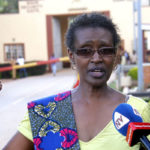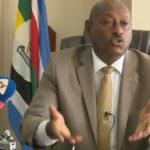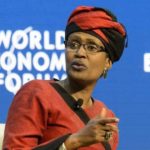Uganda’s Winnie Byanyima is among five candidates competing for the top job at the Joint United Nations Programme on HIV/AIDS to replace Michel Sidibé, who led the organization since 2009 and left in May this year amid controversy.
Ms Byanyima is a strong critic of the Kampala regime and is wife to opposition strongman Kizza Besigye who is a four time contender for the national presidency. The shortlist includes only one woman and four men.
The shortlist includes:
• Salim Abdool Karim, director of the Centre for the AIDS Program of Research in South Africa or CAPRISA.
• Sani Aliyu, director general of the Nigerian National Agency for the Control of AIDS or NACA.
• Chris Beyrer, professor at Johns Hopkins Bloomberg School of Public Health.
• Winnie Byanyima, executive director of Oxfam International.
• Bernard Haufiku, former minister of health and social services of Namibia.
Whomever emerges as the finalist from the shortlist will take over from Gunilla Carlsson, currently acting executive director of UNAIDS. Carlsson was appointed to the position in May, following the resignation of Sidibé, who had a controversial legacy at the organization. The new leader will also be tasked with fixing what was described by an independent panel as a “broken organisational culture” at UNAIDS.
In December 2018, the panel came out with a damning report describing how the aid agency was “in crisis,” with its leaders, as well as its organizational policies and processes, having failed to prevent or respond to allegations of sexual harassment, bullying, and abuse of power. Sidibé, according to the panel’s findings, had “created a patriarchal culture tolerating harassment and abuse of authority.”
For the organization to recover, the panel underscored the need for a new “trustworthy, energetic leader” who has the skillset and experience, including “emotional intelligence,” to foster and implement a “genuinely open culture” where harassment, bullying, and abuse of power no longer exists.
Following the publication of the report, Sidibé announced he would step down in June, but decided to leave earlier to take over as minister of health and social affairs of Mali.
Process confidentiality
In December, UNAIDS’ program coordinating board called for the “immediate initiation” of the selection process for the next executive director, and a search committee was formed to oversee the process. In a published letter, the chair of the committee highlighted the experience and competencies required for the position. The letter stated they were looking for a leader with strategic management skills, including the “ability to manage organizational change and innovation, including leading transformation and reform processes in work culture” and the “ability to effectively address all forms of harassment, discrimination, bullying and abuse of power.”
Get development’s most important headlines in your inbox every day.
Email
Subscribe
The committee encouraged female applicant and geographical diversity among the candidates. It also encouraged applications from people living with HIV, as well as those living with disabilities.
The committee added: “Candidates will be submitted to a rigorous, competitive and transparent selection process.”
Information on the succeeding meetings of the committee were published on UNAIDS’ website, but without publishing the names of candidates vying for the position. This had created numerous rumors about who might be in the running for the top job at UNAIDS.
In response to an inquiry from Devex, Michael Hollingdale, communications manager for UNAIDS, told Devex that the board had decided to follow a process similar to 2008, and that the process “seeks to protect confidentiality of the candidates to the maximum extent possible.”
“Board members have the possibility to express views on the different candidates. Subsequently the Committee of Cosponsoring Organisations, under the leadership of UNFPA’s Executive Director, Dr Natalia Kanem, will be providing its consensus recommendation to the UN Secretary-General who will appoint the Executive Director. There are still several steps left in the process, which reinforces the need to protect the confidentiality of the candidates,” he wrote in an email.
Next steps
Last week, the search committee, during its ninth meeting in Geneva, interviewed shortlisted candidates and has since submitted its report to the program coordinating board. According to the timelines published on the UNAIDS website, the board will meet on June 28 to discuss and consider the report. Afterwards, the search committee will send the list to the Committee of Cosponsoring Organizations — which includes 10 U.N. agencies, the World Bank, and the UNAIDS secretariat — along with any comments and recommendations from the board.
The CCO will conduct a round of interviews with the shortlisted candidates before sending its recommendation to the U.N. secretary general the first week of July.








